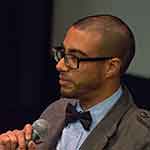The term Latino Islamidad may not yet be mainstream, but a new report explores why a growing number of U.S. Latinos convert to Islam in hopes of understanding what it means to be a Latino Muslim today. The report is published in last month’s Journal of Race, Ethnicity, and Religion.
Findings come from the Latino Muslims Survey (LMS), the most comprehensive social science oriented study of U.S. Latino Muslims, which examines an intersection of religious beliefs and practices; spiritual, moral, social, and ethical views; and the social, civic, and political attitudes of self-identified Latinos and Muslims. Findings are based on an online, bilingual survey of U.S. Latino Muslims conducted from Sept. 8 to Dec. 15, 2014. More than 560 Latino Muslims participated in the nationwide survey.

Dr. Gastón Espinosa, Arthur V. Stoughton Professor of Religious Studies in the Department of Religious Studies at Claremont McKenna College and 2016-2017 William E. Simon Fellow in Religion and Public Life in the Department of Politics at Princeton University, directed the survey in consultation with Dr. Harold Morales of the Department of Philosophy and Religious Studies at Morgan State University and Mr. Juan Galvan, Founder and Director of LatinoDawah.org. Together, they served as principal investigators.
"The study,” Dr. Espinosa said, “is important because it is the largest survey [n = 560] ever conducted on U.S. Latino Muslims and because it helps us to understand why Latinos are converting to Islam, what branches of Islam they are converting into, and their religious, social, gender, and political views.”
One aspect of the report, in part, reexamines the previously held notion that a majority of Latino Muslim converts were drawn to Islam as a rejection of Catholicism. Instead, the findings determined that many converts were attracted to the devotion of Islamic beliefs and practices, perhaps indicating that Islam offers them a deeper sense of daily worship and more traditional boundaries.

While most respondents were previously Catholic, the amount converting from Atheism, Agnosticism, and Secularism (one in 10) illustrates a trend toward faith, with some converts drawn to more conservative religions like Islam. Not only does this directly challenge the idea that religion is declining in the U.S., it reveals, as Espinosa explains, a “dynamic and fluid religious marketplace for religious and non-religious people alike, especially in the nation’s burgeoning immigrant populations.”
Significantly, the survey found that 93% stated that religion provides meaningful guidance in their day-to-day living, with men and women both sharing nearly identical rates. Over 70% reported performing the Muslim prayer (salat) every day, with almost 68% of those respondents stating they pray daily for physical and spiritual healing. About half (51%) either read the Qur’an daily or at least once a week, and 22% report studying the Qur’an with other Muslims once a week or more.
These findings point to a slight schism between the worship practices of Latino Islamidad and the general U.S. Latino population. Almost half (48%) of Latino Muslims surveyed reported attending mosque or religious services once or more a week or almost every week, which is higher than both the general Latino population and the U.S. population.

A common misconception is that these converts first experienced Islam in prison, yet the findings reveal that personal outreach played a much more significant role to converts. The majority of respondents said they first heard about Islam from a friend (40%), while 13% were introduced by a spouse, and 8% by a family member.
The survey uncovered a remarkable aspect of conversion: one of the most important and distinctive ways Muslims preach Islam to Latinos is by focusing on celebrating and re-embracing their Spanish Islamic roots in Spain. In turn, reconnecting to this pre-Catholic Hispanic identity plays a significant role in the Latino Islamidad narrative; while 34% described their decision to embrace Islam as a “conversion,” 40% saw it as a “reversion.”
For further information or for the full report, please contact Gastón Espinosa at gaston.espinosa@cmc.edu.

